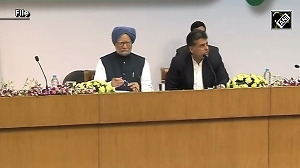The 36th annual meeting of the World Economic Forum began in Davos with Federal Chancellor of Germany Angela Merkel sounding a note of caution on globalisation and urging the need for developing a "new social market economy" as a remedial measure.
The new social market economy did not mean giving up the market principle, but to combine it with such "responsible" measures as would restore people's trust in globalisation, she said.
Addressing the opening plenary session for a little more than an hour, Merkel also warned that the international community would face grave social disorder if it did not agree on a global framework of rules to oversee competition between old industrial and fast-developing economies.
The need for creating "welfare structures" could not be overlooked and the global business community must pay attention to social, environmental and ethical standards to promote sustainable economic development, she said.
Merkel expressed disappointment at the slow progress of multilateralism as was seen at the World Trade Organisation talks on the Doha round and felt that multilateral rules were required to oversee global competition.
She left no one in doubt that she was a strong votary of free trade and was disappointed over the rising trend of bilateralism at the cost of a multilateral structure as endorsed by institutions like the WTO, the International Monetary Fund and the World Bank.
"We need global protection of intellectual property, and an agreement on shared values," Merkel said. She made no secret of her disenchantment with the bureaucracy, that had forced the small and medium companies in Germany to use as much as six per cent of their total expenditure on dealing with the red tape.
The chancellor also outlined her economic policy plan for her country that would favour a more "viable" tax system, reduced labour costs and a more competitive public policy.
Earlier, Swiss President Moritz Leuenberger reiterated the need for the state to create a social safety net for the underprivileged so that they too could respond to their problems in a "creative frame of mind."
Both Merkel and Leuenberger were responding to WEF Executive Chairman Klaus Schwab's call that global leaders should adopt a creative strategy to challenge problems with a new mindset as the world was transforming itself from an information economy into a creative economy, placing more emphasis on the power of innovation.
Significantly, Merkel's note of caution in the opening plenary session was somewhat echoed in another session that examined what would be the business agenda for 2006. Lawrence H. Summers, president of Harvard University, said the main thing the world should fear was the lack of fear itself.
Arguing that global financial markets were currently experiencing an excess of hope and a deficit of fear, he said such investor exuberance created the risk of asset bubbles, delayed necessary structural adjustments and magnified the risk of an eventual "hard landing". Integration of fourth-fifths of the world that was poor with the one-fifth that was wealthy posed the biggest challenge to globalisation, he said.
On the question of the emergence of China and India as the new drivers of growth in the global economy, Jagdish Bhagwati, professor at Columbia University, struck a different note arguing that the assumption of the two Asian countries continuing to enjoy rapid economic growth was not set in stone. "The first thing we need to look at is whether a given course is sustainable," Bhagwati said.
Mukesh Ambani, chairman and managing director of Reliance Industries, who also took part in the discussion, was more optimistic on the emergence of China and India and felt that the two countries could develop new economic models that could be replicated in other low-income countries.






 © 2024 Rediff.com -
© 2024 Rediff.com -